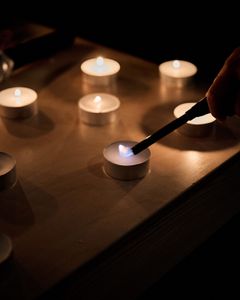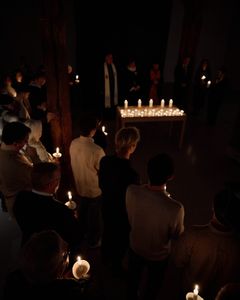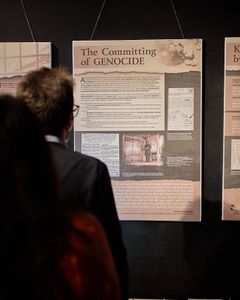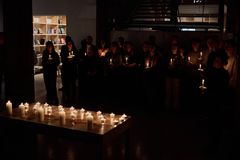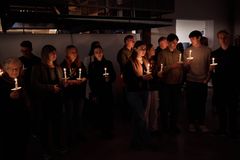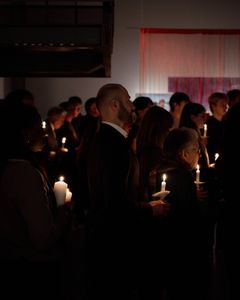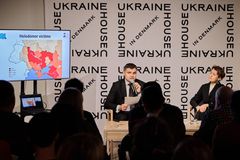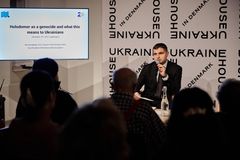Recognizing the Holodomor as genocide is a step to honor the memory of the victims – Dr. Horodyskyy
Dr. Ivan Horodyskyy, Vice-President of the Ukrainian Bar Association, appealed to the Danish parliament with a сordial request to make every effort to establish justice for the victims of the Holodomor by recognizing it as genocide. The expert spoke during the commemorative event “Holodomor – 90: impact on Ukraine and the future of justice” held at Ukraine House in Denmark on Nov. 25.
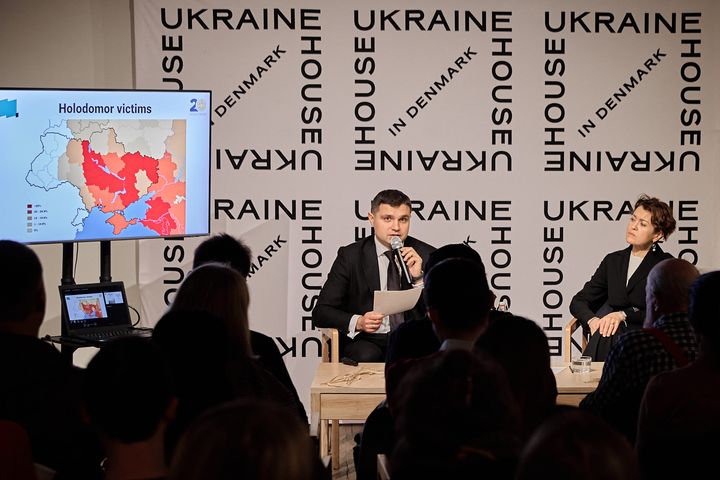
“For many Ukrainians, Denmark is the best example of what the idea of Europe is and should be. In Ukraine, they see and appreciate how unconditionally you supported us and your contribution to our struggle - from F-16 fighter jets to fresh water for the residents of front-line Mykolaiv… On behalf of the legal community of Ukraine, I appeal to our Danish friends with a request to make every effort to establish justice for the victims of the Holodomor by recognizing it as genocide,” said Dr. Horodyskyy.
He reminded the audience that during 1932-33 about 4 million Ukrainians became victims of the Holodomor genocide, the gravest crime recognised by international law. The victims of the Holodomor were killed not only because of their nationality, language or religion but also because of their desire to protect private property and have freedom of choice — the very values shared by Ukraine's modern-day allies. Unfortunately, 90 years later, this fact often is not enough for full worldwide recognition of this crime as genocide.
Dr. Horodyskyy said that from a legal standpoint, there are many challenges to the recognition of the Holodomor as a crime of genocide. However, he noted that many of the possible questions surrounding the recognition have been answered a long time ago.
On Dec. 9, the world will mark the anniversary of the adoption of the UN Convention on Genocide. Its co-author and creator of the crime's definition was Rafael Lemkin, a Second World War refugee and a thorough researcher of Nazi crimes.
Lemkin studied the legal system of the USSR and its criminal law. In 1953, he gave a speech to the Ukrainian diaspora in New York, the title of which was “Soviet Genocide in Ukraine," where he proclaimed that not only the Holodomor, but also the entire policy of the Soviet government aimed at destroying the identity of Ukrainians, was genocide.
In Dr. Horodyskyy’s opinion, Russia's aggression against Ukraine today is a continuation of its past practice of genocide in Ukraine – yet while it is clear that Holodomor of 1932-1933 was a genocide, it will take longer to gather evidence for Russia's current war against Ukraine and qualify it as genocide.
“The problem is that in 1948, different compromises were made and the Genocide Convention envisaged only physical genocide. Rafael Lemkin’s definition of genocide included notions that were broader and went beyond that of physical destruction. It included cultural genocide, social genocide, and many other types of genocide which we can see now in the temporary Russian-occupied territories of Ukraine,” explained Dr. Horodyskyy.
Photos: Alex Benes
For press inquiries, please contact Maya Zakhovaiko press@ukrainehouse.dk
Billeder
Følg pressemeddelelser fra Ukraine House in Denmark
Skriv dig op her, og modtag pressemeddelelser på e-mail. Indtast din e-mail, klik på abonner, og følg instruktionerne i den udsendte e-mail.
Flere pressemeddelelser fra Ukraine House in Denmark
“We need to insist that Russians deal with their history and that they move on from their colonial past.” Decolonising Mindsets for Security in Ukraine and Europe Forum at the Ukraine House in Denmark6.5.2024 12:25:40 CEST | Pressemeddelelse
Copenhagen, Denmark - On Friday, April 26th, Ukraine House in Denmark in partnership with the Danish Institute for International Studies and the Embassy of Ukraine in Denmark hosted a forum that brought together experts on disinformation and decolonisation from Denmark, Ukraine, Germany, Georgia, and the Chechen Republic of Ichkeria to delve into the critical issues surrounding Russian colonialism and its impact on international relations today. The forum was moderated by Niels Ivar Larsen of Information.dk. The event was opened by the Ambassador of Ukraine to Denmark, Andriy Yanevsky, and the chair of the Ukraine House in Denmark Nataliia Popovych. The first panel, featuring Maksym Eristavi, a journalist and writer, author of “Russian Colonialism 101”, Flemming Splidsboel Hansen, Senior researcher at Danish Institute of International Studies, Mette Skak, Associate professor at the Department of Political Science at Aarhus University, and Yevgeniy Golovchenko, Tenure Track Assistant Pr
Briefing from the Frontline: Meet the Da Vinci Wolves Battalion Defenders22.4.2024 07:00:00 CEST | Presseinvitation
Together with KOLO Nordic and Frihed for Ukraine, we invite you to a meeting with several soldiers from one of the most remarkable Ukrainian units, the Da Vinci Wolves Battalion, on 23.04.2024, 17:00 at the Ukraine House in Denmark. The battalion is known for their courage and fearless defense of Ukraine during the full-scale invasion, markedly during the Kharkiv counteroffensive. The soldiers that will be visiting are Serhii Filimonov, Alina Mykhailova, Andriy Pysarenko, Olexandr Yabchanka, and Oleksi Makhrynsky.
Decolonizing Mindsets for Security in Ukraine and Europe19.4.2024 07:00:00 CEST | Presseinvitation
Dear Friend of the Ukraine House, In 2024, we still witness the consequences of imperial ambitions and the legacy of colonialism affecting international relations in Europe and threatening European security. The full-scale Russian war of aggression against Ukraine showed the real danger of ignoring the voices of the colonised, repressed and persecuted, and regarding only the former empire as a worthwhile stakeholder in international relations. What would the world have looked like if Russia wasn’t received with impunity after it launched its brutal wars of recolonisation against Ichkeria, Moldova, Georgia and Ukraine? Perhaps currently we would not be facing the largest war in Europe since the Second World War.
“We all have a certain striving to freedom within us” – New Ukrainian poetry and music at the Ukraine House in Denmark with the poet Julia Musakovska and the musician Sofia Shvager15.4.2024 09:00:00 CEST | Pressemeddelelse
Earlier in spring, the Ukraine House in Denmark hosted an evening of new Ukrainian poetry and music with poet and translator Yuliya Musakovska arriving from Ukraine and the Copenhagen-based Ukrainian musician Sofia Shvager. The evening began with the presentation of Yuliya’s latest poetry collection “The God of Freedom” (2021). The key takeaways from the moderated presentation and Yulyia’s readings of her poetry are here:
20 Days in Mariupol28.3.2024 09:00:00 CET | Pressemeddelelse
“Everyone must watch this film so as to prevent Russia from creating Mariupols everywhere”: Oscar-winning "20 Days in Mariupol Screening" in Denmark.
I vores nyhedsrum kan du læse alle vores pressemeddelelser, tilgå materiale i form af billeder og dokumenter samt finde vores kontaktoplysninger.
Besøg vores nyhedsrum
